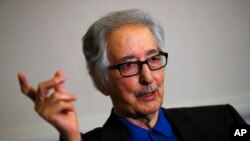Abolhassan Banisadr, the first president of Iran's Islamic Republic, died Saturday in Paris at the age of 88 following a lengthy illness.
Banisadr, who returned to Iran with the founder of the Islamic Republic Ayatollah Khomeini after the downfall of Shah Mohammed Reza Pahlavi in 1979, was elected with the support of his mentor Khomeini in 1980. Khomeini later withdrew that support forcing Banisadr to flee for France in 1981.
Banisadr had been a spokesman and top aide of Khomeini's during his exile in France in the 1970s.
Banisadr's year-and-a-half in office were marred by the Islamic Republic's deteriorating relations with its Arab neighbors and the West, including the U.S. Banisadr told journalists during one of his press conferences in 1980 that he spent most of his time visiting the front lines of the war with Iraq, where he was popular with Iran's troops and military leaders.
The lengthy hostage crisis at the U.S. Embassy in Tehran also took place during Banisadr's tenure, as did an unsuccessful U.S. effort to rescue the hostages by then-President Jimmy Carter, which was aborted after a U.S. helicopter crashed into a transport plane.
Banisadr was forced to flee Tehran for France in 1981 following protests against him by religious supporters of Khomeini, after the supreme leader withdrew his support from his erstwhile aide.
Former Iranian diplomat Mehrdad Khonsari told VOA that Banisadr was a "fairly likeable figure," with "democratic leanings," who owed his election to Ayatollah Khomeini and his clerical followers, who increasingly sought to Islamicize the country:
He had the blessing of Khomeini in the first presidential election that was conducted, and he won because of him, but then he started falling out with the key people around Khomeini and the clerics, who were bent on extricating all secular elements from the government and usurping power, monopolizing power in their own hands, despite the fact that [Banisadr] was quite popular in the army because of his work and dedication during the Iran-Iraq War.
Banisadr remained active politically, despite his exile in Paris, and during his many conversations with VOA expressed a keen love for his homeland and for the Iranian people, with whom he empathized in their struggle against what he called the "clerical regime."












